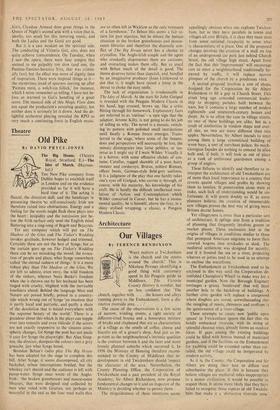Theatre
Old Pike
By DAVID PRYCE-JONES The Big House. (Theatre Royal, Stratford, E.)—The Ides of March. (Haymar- ket.)
THE New Pike company from Dublin hopes to establish itself in London and on the evidence provided so far it will have a hard time of it. The acting is flaccid, the direction dull, and the handicaps ■n presenting theatre 'so self-consciously Irish are therefore raised into obstructions. Energy and a feeling for the words might flash these plays into the heart : insipidity and the narcissism just be- low the Irish surface only send the English mind fluttering into a sing-song of Begob and Bejayzus.
Yet any company which will put on The Shadow of the Glen and The Tinker's Wedding invokes gratitude, however hedged and trimmed. Certainly these are not the best of Synge, but as the curtain goes up on The Tinker's Wedding there can be no mistaking the mood, the evoca- tion of people and place, what Synge somewhere called 'the eternal sadness of things.' It is a more robust play than The Shadow of the Glen. We arc left to admire, even envy, the wild freedom of the tinkers, whereas Nora Burke's freedom when she is thrown out by her husband has been tinged with cruelty, blighted with the inevitable loneliness ahead. Behind the language Man and Nature are poised.briefly, poised in a country- side which wrung out of Synge 'an emotion that is partly local and patriotic, and partly a share of the desolation that is Mixed everywhere with the supreme beauty of the world.' There is a grandeur about this which in the plays can topple over into conceits and even ridicule if the actors are not exactly responsive to the sinuous atmo- spheric changes, for Synge the poet has not made it easy for Synge the playwright. But Alan Simp- son, the director, dampens the colours into a grey gouache, just what Synge hated. Brendan Bchan's radio play The Big House has been adapted for the stage to complete this bill. After Synge, it seems discomposed, all city backchat; urban interruptions bottled, but the whiskey isn't shared and the audience is left with pump-water. Synge once wrote of the Anglo- Irish : 'the broken greenhouses and mouse-eaten libraries, that were designed and collected by men who voted with Grattan, are perhaps as mournful in the end as the four mud walls that are so often left in Wicklow as the only remnants of a farmhouse.' To Behan this seems a fair re- turn for past injustice, but he misses the human situation in the broken greenhouses and mouse- eaten libraries and therefore the dramatic con- flict of The Big House never has a chance to crystallise. The Anglo-Irish couple and the agent who crookedly dispossesses them arc cartoons, and overacting makes them silly. But as usual with Behan much of the detail is good. The theme deserves better than slapstick, and, handled by an imaginative producer (Joan Littlewood to dot that i), it might have raised a lump in the throat to choke the easy smile.
The lack of organisation is irredeemable in The Ides of March. At the start Sir John Gielgud is revealed with the Penguin Modern Classic in his hand, legs crossed, brows up, like a critic flitting through his homework. Explanatory facts are referred to as 'curious'—a sure sign that the adaptor, Jerome Kilty, is not going to do his job of telling us why. The novel is a mosaic, switch- ing its pattern with polished small interjections until finally a Roman fresco emerges. Trans- ferred to the stage, where some of the innuen- does and perspectives will necessarily be lost, the mosaic disintegrates into loose pebbles, or tes- serae as I might say if I were Wilder. Visually it is a horror, with some offensive clichés of cos- tume. Catullus, ragged shamble of a poet, hairy sweater and corduroys; Brutus, noblest Roman, officer boots, German-style field-grey uniform. It is a judgment of the play that one hardly takes one's eyes off Gielgud, who carries it through, of course, with his maturity, his knowledge of his craft. He is hardly the difficult intellectual reso- lution of Action and Contemplation which Wilder conceived in Caesar, but he has a monu- mental quality, he is himself, above the fray, in a shiny stylised wrapping, a classic, a Penguin Modern Classic.






























 Previous page
Previous page